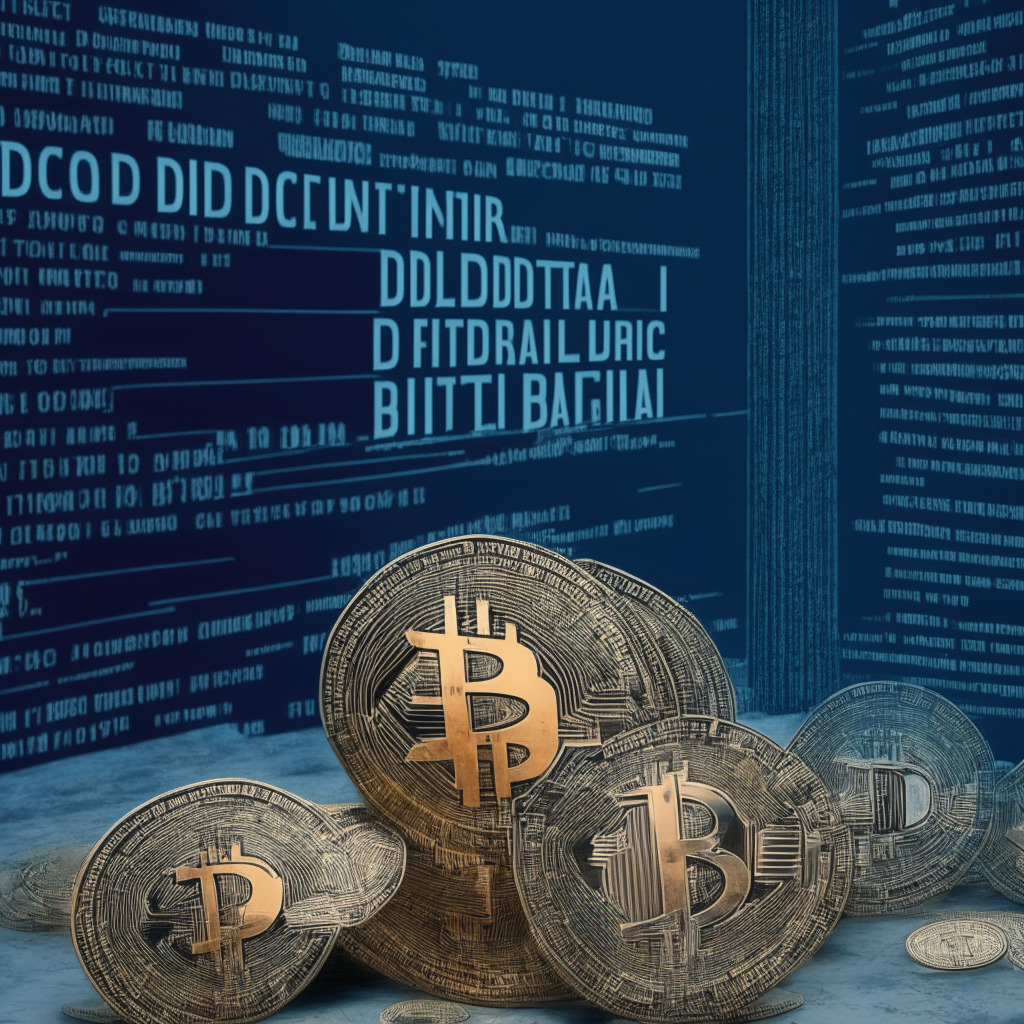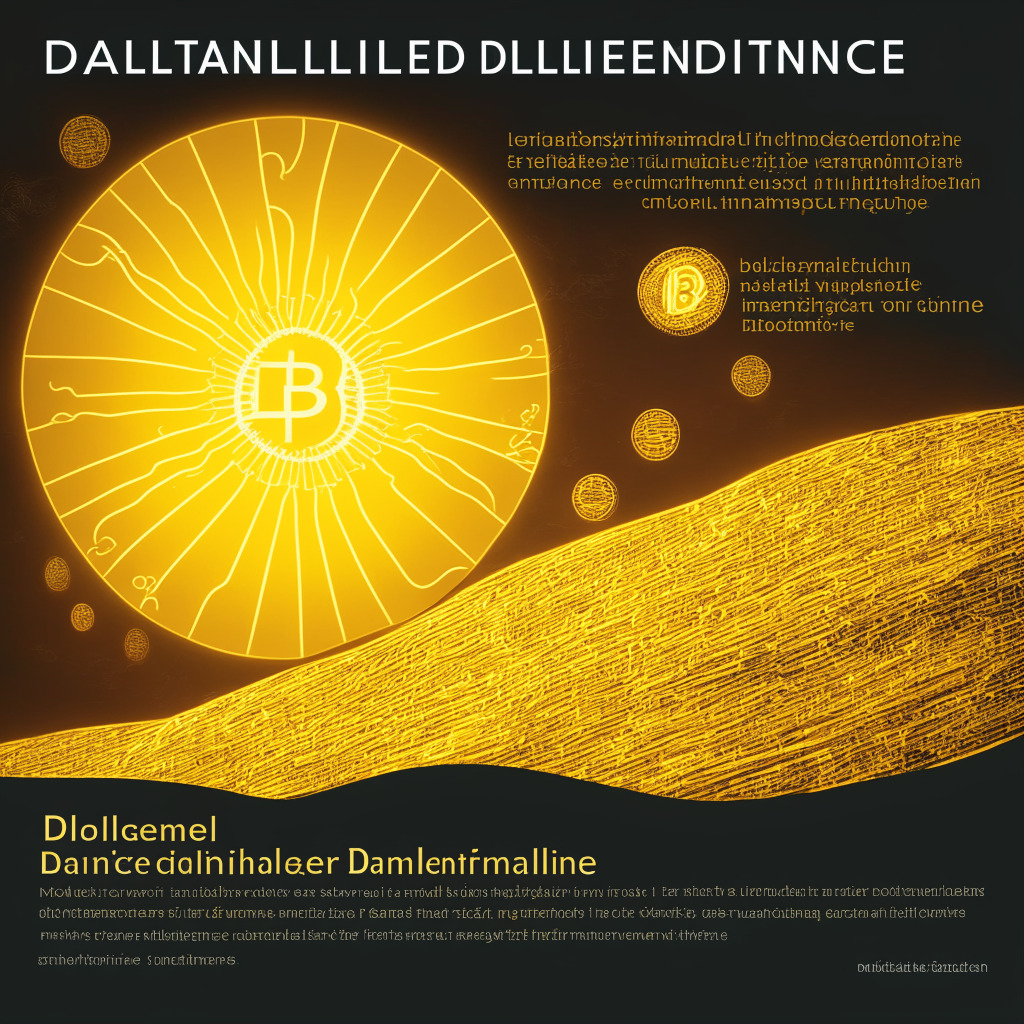“In an act of unprecedented vigilance, the United States banking system has been alerted to the ‘novel and complex’ risks presented by cryptocurrencies, highlighted in a recent report by the Federal Deposit Insurance Corporation (FDIC). The FDIC has demarcated a critical area regarding digital assets risk in its annual risk review, focusing on the burgeoning and volatile crypto market.”
Search Results for: FDIC
FDIC Criticizes OKCoin: The Importance of Transparency in Crypto Insurance Claims
The FDIC accuses crypto exchange OKCoin of making misleading statements about FDIC insurance coverage on their platform. The regulator demands removal of fraudulent claims, stressing the importance of transparency and regulatory cooperation in the growing crypto industry.
OKCoin’s FDIC Misstep: What It Means for Crypto Consumer Protection and Industry Transparency
The U.S. FDIC issued a demand to cryptocurrency exchange OKCoin for misleading statements suggesting FDIC protection on customers’ accounts. This highlights the need for accurate communication and transparency, as well as adherence to regulations, in the rapidly evolving crypto industry.
Risky Payment Apps vs Secure Bitcoin: Navigating FDIC Protection & Financial Security
The Consumer Financial Protection Bureau (CFPB) warns that funds stored in popular payment apps may not be insured, highlighting possible financial uncertainties. Bitcoin, with its decentralized nature and self-sovereignty, gains attention as a secure alternative providing users sole ownership and control over their funds, unlike payment apps.
Uninsured Dangers: Digital Payment Apps, Crypto Exchanges, and the FDIC’s Role in Protecting Funds
The Consumer Financial Protection Bureau (CFPB) recently warned that digital payment apps like PayPal and Venmo, as well as crypto exchanges, lack FDIC insurance, posing risks to users’ funds. The FDIC has been targeting crypto companies making misleading claims about their insured status, emphasizing that no crypto exchanges are insured by the FDIC. Users must be cautious of potential risks associated with these platforms.
P2P Payment Apps: Uncovering Hidden Risks and the Importance of FDIC Coverage
The US Consumer Financial Protection Bureau warns that funds stored in nonbank payment platforms, including those offering crypto services, may not be protected by federal deposit insurance coverage. With recent collapses involving major banks, consumers must exercise caution and understand potential risks when managing assets through online payment services.
FDIC Blames Crypto for Bank Collapses: Analyzing Risk Factors and Future Implications
The FDIC chair, Martin Gruenberg, attributes non-compliance with risk controls, poor governance, and dependence on uninsured crypto deposits to the collapse of crypto-friendly banks like Signature Bank and Silicon Valley Bank. While cryptocurrencies played a part, sound governance and responsible investments are essential for financial stability.
Cross River Bank’s Regulatory Tug-of-War: Facing FDIC Scrutiny While Serving the Crypto World
On one hand, Cross River Bank has earned its reputation as a major player in […]
Navigating Economic Uncertainly: Bitcoin and Market Stability Amidst Rising Inflation
“U.S. economy experiences instability with personal consumption expenditure inflation index rising by 3.5%. U.S. Treasuries depreciated by $1.5 trillion due to recent rate hikes, raising investor concerns about assets like Bitcoin and trading market’s ability to weather rising interest rates.”
Bank Ruin and Crypto Scam: A Cautionary Tale from Kansas Heartland
“In a blow to Heartland Tri-State Bank, its CEO lost millions in a cryptocurrency scam. This incident highlights the risks attached to crypto investments, ultimately leading to the bank’s insolvency. The event underscores the need for regulation and vigilance in the crypto landscape.”
Exploring Venmo’s Expansion to Crypto Services: Boon or Bane?
Venmo, a comprehensive financial service, is allowing users to navigate the complexities of cryptocurrencies, even including assets like Bitcoin to its money transfer system. However, while users can purchase Bitcoin through various funding options, potential pitfalls such as scams, irreversible transactions, and the lack of protection from FDIC raise a need for careful consideration before diving into cryptocurrency purchasing.
Is PayPal’s Ethereum-based Stablecoin, PYUSD, Truly 100% Asset-Backed? Examining the Claims
“PayPal’s Ethereum-based stablecoin, PYUSD, has full asset backing, primarily from U.S. Treasury reverse repurchase agreements, says Paxos. Though overcollateralization safeguards assets, it could limit profits. Some PYUSD assets are in uninsured cash deposits, reflecting typical banking risks. PYUSD’s transparent operation may soothe some investors while raising others’ skepticism.”
Navigating Bitcoin Transactions through Cash App: A Convenient Tool or a Security Nightmare?
“Cash App, developed by Block Inc, has won popularity for facilitating Bitcoin transactions, with its ‘Auto Invest’ tool easing price volatility. However, limitations exist in Bitcoin-only support and transactional data vulnerability. Also, funds lack FDIC or FSCS insurance, warranting caution.”
Navigating the Treacherous Terrain: Crypto-Assets and their Impact on the Banking Sector
“Crypto assets pose significant, complex challenges to the banking sector, as shown in FDIC 2023 Risk Review. Key issues include fast-paced innovation, legal ambiguity, immature risk management, ‘contagion risk’, and ‘stablecoin run’ risks. However, carefully negotiating these challenges could harness innovative benefits.”
Regulatory Shift: The Stifling or Stability of Cryptocurrency in U.S. Banking
“The U.S. FDIC’s latest risk report indicates a shift from previously indifferent stance towards considering cryptocurrency as an area of concern. The 2023 Risk Review shows FDIC’s readiness to initiate discussions with banks about crypto-asset activities, echoing similar sentiments across U.S. banking agencies. Yet, it also reveals the complex balancing act required in integrating digital assets safely into the conventional banking system.”
Central Bank Digital Currency: A Financial Freedom Foe or Decentralized Ally?
Joe Rogan and Post Malone voiced skepticism about US central bank digital currency (CBDC), seeing it as potentially enabling government control over individual finances. This controversy, along with alternatives such as decentralized cryptocurrencies, forms a pivotal part of ongoing discussions about the future of digital currencies.
Banking Crisis Ripple: Heartland Tri-State Bank’s Collapse & Its Implications on Industry Safety
“The disruption in the U.S. banking sector, illustrated by the recent collapse of Heartland Tri-State Bank, is attributed to rising U.S. interest rates and inadequate risk management. This crisis highlights a need for improved banking system safety measures and increased bank executive accountability.”
Navigating the Abyss: Banking Crises, Counterparty Risks and the Rise of Crypto Solutions
“Sombre banking crises globally reveal the fragility of traditional banking systems. Crypto presents an exciting possibility – self-custody. This enables investors to control risk factors, gain insight into asset compositions and oversight over counter-party involvement in the asset cycle, hence highlighting the dire need for alternative financial systems.”
Circle’s Ties to Collapsed SVB: Stablecoins’ Resilience and Lessons in Risk Management
The now-collapsed Silicon Valley Bank (SVB) reportedly had Circle as its single largest asset-weighted customer, holding $3.3 billion at the time of collapse. The incident raises questions about stablecoins like Circle’s USDC and underlines the importance of due diligence and contingency planning in the crypto industry.
Collapse of Crypto-Friendly Banks: Time to Rethink Deposit Insurance Limits?
Circle and Sequoia Capital were among top depositors in collapsed Silicon Valley Bank (SVB), raising concerns about depositor fund security and current regulations in the crypto space. The situation highlights the potential need for increased deposit insurance limits as more financial institutions embrace cryptocurrencies and blockchain technology.
Wyoming Judge Denies Fed Dismissal in Custodia Bank Case: Implications for Blockchain Banks
A Wyoming federal judge denied dismissal motions in Custodia Bank’s legal battle with the Fed, raising questions about the Fed’s role in overseeing digital asset banks. The outcome could impact future adoption and growth of blockchain banks and the Federal Reserve’s vetting role regarding these institutions.
Coinbase Stock Plunge Amid SEC Lawsuit: Balancing Innovation and Regulation in Crypto
The SEC filed a lawsuit against Coinbase, alleging unregistered operations and staking program, leading to a 20% stock plunge. This highlights the ongoing conversation about balancing innovation and regulation in the cryptocurrency industry as authorities take a more assertive stance.
Exploring the First BRC-20 Stablecoin: StablyUSD’s Controversial Launch and Implications
The first BRC-20 stablecoin, Stably USD, has been introduced to the Bitcoin ecosystem, sparking debate among prominent figures. Stably, a U.S.-based company, promotes this dollar-backed stablecoin. However, red flags exist, including an unfeasible total supply and discrepancies in registration data. The future of this BRC-20 stablecoin remains uncertain.
Collapse of Signature Bank: Crypto Exposure, Regulation, and Lessons for the Future
The collapse of Signature Bank highlights the potential systemic risks posed by crypto-linked banking activities and the importance of stringent regulatory oversight. It serves as a cautionary tale about unchecked growth, inadequate risk management, and the need for proper risk management practices in the volatile and rapidly evolving crypto industry.
Signature Bank Collapse: Crypto Exposure’s Role and Lessons for Future Regulations
FDIC Chairman Martin J. Gruenberg suggests that the failure of Signature Bank may be partly due to its inability to comprehend risks tied to cryptocurrencies and inadequate management. While the direct impact of crypto exposure on the bank’s collapse remains unclear, it highlights the need for closer scrutiny on crypto market regulations.
Bank Deposits Decline: Crypto’s Surge or Inflation’s Crippling Effects?
US bank deposits are nearing $17 trillion, possibly signaling a shift towards cryptocurrencies like Bitcoin. Factors like bank failures, inflation concerns, and increased interest rates contribute to this decline, driving investors to explore alternative investment opportunities such as crypto. However, caution and thorough research are necessary before committing to cryptocurrency investments.
Argentina’s Economic Crisis: Impact on Crypto, Traditional Assets, and Safe Havens
Argentina’s economic crisis, involving hyperinflation and peso devaluation, has led to discussions on the role of gold and cryptocurrencies like Bitcoin. Limited by costs and government control, fintechs in the country turn to stablecoins for remittances, while the financial turmoil may benefit risk-on assets such as Bitcoin.
Exploring the Role of Crypto in Signature Bank and Silicon Valley Bank Failures
The United States Government Accountability Office (GAO) report cites poor governance and unsatisfactory risk-management practices as primary causes of Signature Bank’s failure in March, acknowledging the bank’s exposure to the crypto industry as a potential contributing factor. The continued debate on the role of crypto in failed banks’ circumstances directly affects the fintech and regulatory spaces.
2023 Crypto Crackdown: Operation Choke Point 2.0 vs Banking Industry Collapse
The US regulators’ crackdown on the crypto market has led to the closure of Silvergate, Silicon Valley Bank, and Signature, while prominent figures criticize scapegoating cryptocurrencies for the banking crisis. The House Financial Services Committee investigates potential coordinated efforts to de-bank the crypto market as the banking crisis worsens.
US House Committee Seeks Crypto Clarity Amid SEC Contradictions and Offshore Exodus
The U.S. House Financial Services Committee aims to clarify digital asset regulations amid contradictory actions from SEC Chair Gary Gensler. As U.S.-based crypto firms consider moving offshore due to regulatory crackdowns, upcoming hearings will address regulatory gaps and potential coordinated efforts by regulators for “Operation Choke Point 2.0” to de-bank the crypto market.
Declining Trust in Banks: Will Crypto Emerge as Safer Alternative Amid Financial Turmoil?
A recent Gallup poll reveals that 48% of respondents in the US are concerned about their money in banks, with 20% being “very concerned.” In the context of the US banking system’s challenges, it remains to be seen if cryptocurrencies can emerge as a more stable and secure alternative for consumer finances.
Stagnation Strikes: Fed Rate Hikes, Alleged Token Manipulation, and Kennedy’s Crypto Conspiracy
This week in crypto: Stagnation due to the Fed’s interest rate hike, Binance’s “CZ” Zhao flags Tron CEO’s suspicious token transfer, crypto-based conspiracies from 2024 Presidential hopeful, reports of Amazon’s possible NFT marketplace launch, and El Salvador incentivizes tech innovation.






























